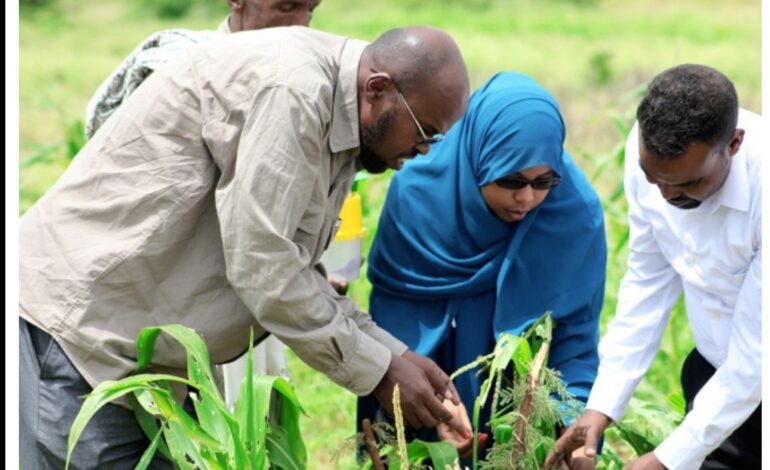
(FAO)- We lose up to 40% of our food crops, to plant pest and diseases.
With the Caribbean’s drive to increase food production and the growing impacts of climate change, policies and actions to promote plant health are fundamental for reaching the Sustainable Development Goals, in particular those aimed at eliminating hunger and malnutrition and reducing poverty and threats to the environment.
In recognition of the inaugural International Day of Plant Health to be observed annually on 12 May and a key legacy of the International Year of Plant Health 2020, The Food and Agriculture Organization of the United Nations (FAO) highlights the damaging consequences of pests and diseases and the critical importance of good plant health to ensuring food security and nutrition and the protection of livelihoods, biodiversity and the environment.
Growing vulnerability to plant pests and diseases
FAO’s Scientific Review on the Impact of Climate Change on Plant Pests shows that the rise in temperature and change in weather patterns due to climate change will increase the risk of pests spreading in agricultural and forestry ecosystems. Climate change-induced pest dispersal and intensity threaten food security as a whole. Small holders, people whose livelihoods rely on plant health and those who live in countries beset by food insecurity are especially vulnerable to these risks; with invasive pests being one of the main drivers of biodiversity loss. The vulnerability of the Caribbean to climate change and the accompanying emergence of new plant pests and diseases means the management and promotion of plant health is critical to food security and increased food production.
Managing pests and preserving health
With plant pests and diseases threatening crop production and agriculture, the protection of plants is a priority for FAO. Taking proactive measures to protecting plants from pests and diseases is far more cost effective than dealing with plant health emergencies. As, once established, they are often impossible to eradicate, and managing them is time consuming and expensive. Also very important, are the methods used to control and manage pests and diseases, and ensuring these do not compromise human health and the environment.
In managing pests and diseases, it is crucial to consider that in all habitats, the production of plants and plant material should take place in an environment which is non-toxic and safe for plant production and harvest and also, for the many diverse organisms which provide ecosystem services that serve, protect and favourably enhance the environment in which we live.
Pesticides, a problematic line of defence
According to Guy Mathurin, Regional Project Coordinator for the FAO Caribbean Pesticide Management Project, “Very often the first resort for farmers and agriculturalists to manage plant pests and diseases in food production is the use of pesticides. Highly Hazardous Pesticides (HHPs) in particular can have long-lasting negative effects on human health and the environment.”
In addition, pests and diseases can build-up resistance to synthetic chemical pesticide products which make them ineffective and this in turn, further exacerbates the health risks posed to users, bystanders, consumers and the environment.
Alternative methods to safeguard plant health
The Coordinating Group of Pesticide Control Boards of the Caribbean (CGPC) through the FAO Caribbean Pesticide Management Project have been working to identify viable, sustainably sourced and economical alternatives to HHPs. With the aim to promote farmer and consumer health and safety and phase out HHPs. This work has included the identification of national and regional priorities for the development of a HHP Risk Reduction Plan for the Caribbean and the promotion of integrated pest, disease and weed management using nontoxic alternatives including cultural and physical methods, bio pesticides, botanicals and biological control.
Beyond the direct application of pesticides
Safeguarding plant health extends beyond the direct application of pesticides to combat pests and diseases, to ensuring that throughout the pesticide life-cycle there are policies and management practices that can ensure that human and environmental health are holistically considered. In seeking to address these issues that ultimately impact plant health, the project has supported the removal of 320 tonnes of obsolete pesticide stocks from project countries, the management of empty pesticide containers, developed updated model pesticide legislation and the training of pesticide registrars and technicians in the use of the FAO Pesticide Registration Toolkit.
Recognising the need for education of all involved in the process of preserving plant health, inclusive of those involved in pesticide life cycle management, Mathurin stresses, “We all have an important role to play in the research and development of alternative methods to manage plant pests and diseases, we need to remain vigilant and closely observe our plants in all habitats and report any suspected problems to plant health authorities. Without healthy plants, food supply and forest resources are reduced, which adversely affect biodiversity and clean water supplies”.












1 Comment
When we destroy the Soil, we are destroying future life. As a generation, we have the responsibility to turn this around.
Rabbit manure, rabbit feetilizer, is available as premium garden fertilizer packed with nitrogen, phosphorus, potassium, minerals and micronutrients. It contains beneficial trace elements such as calcium, magnesium, sulfur, copper, just to name a few. Needless to say it improves and adds fullness to the soil, and quality…of yield… …and can make a flowerbed or backyard herb garden absolutely blooming healthy.
Pure. Raw. Organic ORGANIC PESTICIDE
Rabbit Formula
Golden yellow or Amber orange
Organic Pesticide: repels insects, pest such as Aphids, mites, bugs,, leaf miners,…through its pungent smell …